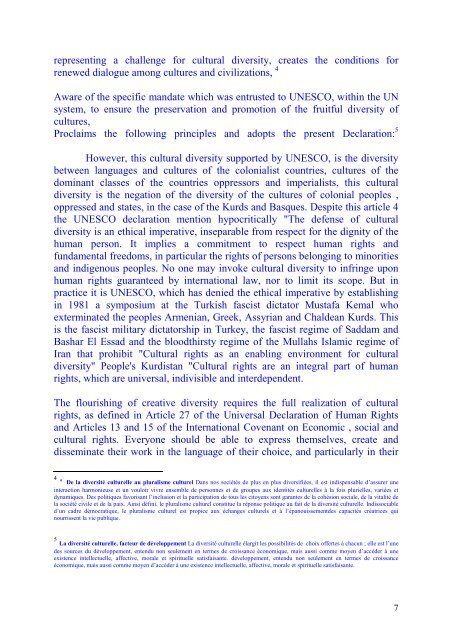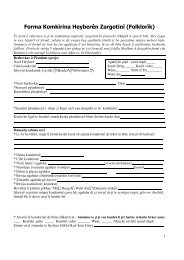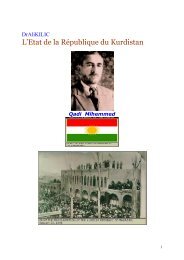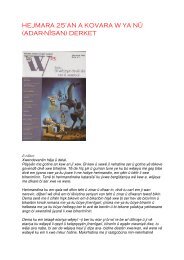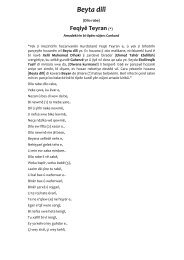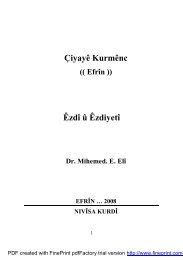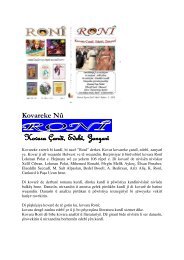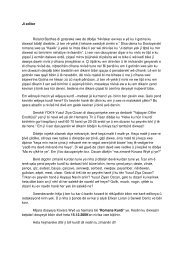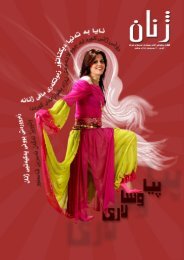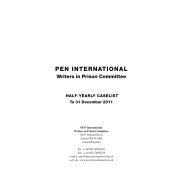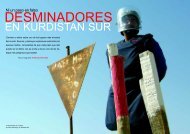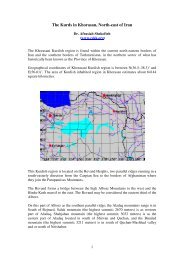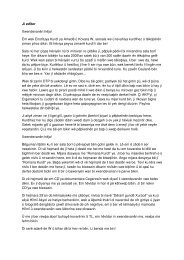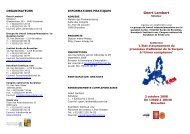UNESCO and The International Day of Mother Language - Pen-Kurd
UNESCO and The International Day of Mother Language - Pen-Kurd
UNESCO and The International Day of Mother Language - Pen-Kurd
- No tags were found...
Create successful ePaper yourself
Turn your PDF publications into a flip-book with our unique Google optimized e-Paper software.
epresenting a challenge for cultural diversity, creates the conditions for<br />
renewed dialogue among cultures <strong>and</strong> civilizations, 4<br />
Aware <strong>of</strong> the specific m<strong>and</strong>ate which was entrusted to <strong>UNESCO</strong>, within the UN<br />
system, to ensure the preservation <strong>and</strong> promotion <strong>of</strong> the fruitful diversity <strong>of</strong><br />
cultures,<br />
Proclaims the following principles <strong>and</strong> adopts the present Declaration: 5<br />
However, this cultural diversity supported by <strong>UNESCO</strong>, is the diversity<br />
between languages <strong>and</strong> cultures <strong>of</strong> the colonialist countries, cultures <strong>of</strong> the<br />
dominant classes <strong>of</strong> the countries oppressors <strong>and</strong> imperialists, this cultural<br />
diversity is the negation <strong>of</strong> the diversity <strong>of</strong> the cultures <strong>of</strong> colonial peoples ,<br />
oppressed <strong>and</strong> states, in the case <strong>of</strong> the <strong>Kurd</strong>s <strong>and</strong> Basques. Despite this article 4<br />
the <strong>UNESCO</strong> declaration mention hypocritically "<strong>The</strong> defense <strong>of</strong> cultural<br />
diversity is an ethical imperative, inseparable from respect for the dignity <strong>of</strong> the<br />
human person. It implies a commitment to respect human rights <strong>and</strong><br />
fundamental freedoms, in particular the rights <strong>of</strong> persons belonging to minorities<br />
<strong>and</strong> indigenous peoples. No one may invoke cultural diversity to infringe upon<br />
human rights guaranteed by international law, nor to limit its scope. But in<br />
practice it is <strong>UNESCO</strong>, which has denied the ethical imperative by establishing<br />
in 1981 a symposium at the Turkish fascist dictator Mustafa Kemal who<br />
exterminated the peoples Armenian, Greek, Assyrian <strong>and</strong> Chaldean <strong>Kurd</strong>s. This<br />
is the fascist military dictatorship in Turkey, the fascist regime <strong>of</strong> Saddam <strong>and</strong><br />
Bashar El Essad <strong>and</strong> the bloodthirsty regime <strong>of</strong> the Mullahs Islamic regime <strong>of</strong><br />
Iran that prohibit "Cultural rights as an enabling environment for cultural<br />
diversity" People's <strong>Kurd</strong>istan "Cultural rights are an integral part <strong>of</strong> human<br />
rights, which are universal, indivisible <strong>and</strong> interdependent.<br />
<strong>The</strong> flourishing <strong>of</strong> creative diversity requires the full realization <strong>of</strong> cultural<br />
rights, as defined in Article 27 <strong>of</strong> the Universal Declaration <strong>of</strong> Human Rights<br />
<strong>and</strong> Articles 13 <strong>and</strong> 15 <strong>of</strong> the <strong>International</strong> Covenant on Economic , social <strong>and</strong><br />
cultural rights. Everyone should be able to express themselves, create <strong>and</strong><br />
disseminate their work in the language <strong>of</strong> their choice, <strong>and</strong> particularly in their<br />
4 4 De la diversité culturelle au pluralisme culturel Dans nos sociétés de plus en plus diversifiées, il est indispensable d’assurer une<br />
interaction harmonieuse et un vouloir vivre ensemble de personnes et de groupes aux identités culturelles à la fois plurielles, variées et<br />
dynamiques. Des politiques favorisant l’inclusion et la participation de tous les citoyens sont garantes de la cohésion sociale, de la vitalité de<br />
la société civile et de la paix. Ainsi défini, le pluralisme culturel constitue la réponse politique au fait de la diversité culturelle. Indissociable<br />
d’un cadre démocratique, le pluralisme culturel est propice aux échanges culturels et à l’épanouissementdes capacités créatrices qui<br />
nourrissent la vie publique.<br />
5 La diversité culturelle, facteur de développement La diversité culturelle élargit les possibilités de choix <strong>of</strong>fertes à chacun ; elle est l’une<br />
des sources du développement, entendu non seulement en termes de croissance économique, mais aussi comme moyen d’accéder à une<br />
existence intellectuelle, affective, morale et spirituelle satisfaisante. développement, entendu non seulement en termes de croissance<br />
économique, mais aussi comme moyen d’accéder à une existence intellectuelle, affective, morale et spirituelle satisfaisante.<br />
7


